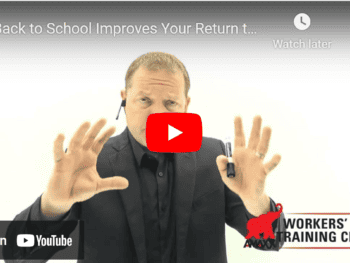
Why Supervisors?
Supervisors play an essential role in the workers’ compensation process. In essence, they are on the front lines of the claims process. Critical roles supervisors play in the workers’ compensation system include:
- Establishing a culture of safety in the workplace by ensuring all employees have a work environment that fosters hard work and everyone going home at the end of the day;
- Ensuring that all employees have immediate access to proper first aid supplies and immediate medical care following a work injury; and
- It is educating all employees on the workers’ compensation process. This includes making sure all injuries are reported accurately and timely.
Click Link to Access Free PDF Download
“9-Element Blueprint To Create Your Workers’ Comp Employee Brochure”
Now is the time to make sure supervisors are ready to assume their important role in the workers’ compensation process.
Ensure Supervisors Have Proper Training
All supervisors should be required to undergo additional training on workplace safety and the workers’ compensation claim processes. They also must be able to recall and implement that training. Keys to ensuring supervisors can implement this include:
- Quality and consistent training on workplace safety, understanding the workers’ compensation claim process and accurately reporting work injuries.
- Have supervisors positioned to deliver on the training they have received; and
- Evaluate the effectiveness of training provided to their supervisors and ensure change can be made to make it effective.
Now is the time to make sure supervisors are appropriately positioned to deliver on what is needed before and after a work injury. It is also vital to ensure they perform these activities with empathy and respect.
Supervisor Best Practices to Implement in Work Comp
Upper management and members of the claim management teamwork with supervisors to assist them in becoming effective and best-in-class workers’ compensation advocates. This will take time to develop and result in a better claims program. Now is the time to invest in supervisors to drive results and improve workers’ compensation programs.
- Teach empathy: It is crucial to treat all injured employees with respect. Even if the employee is combative and rude, remaining calm, being non-judgmental, and not accusing is essential. A supervisor can serve as a role model for the employees they supervise and help guide upper management to set a better tone for enhancing workplace morale.
- Set realistic expectations: Supervisors are uniquely positioned within an organization or company to drive how an employee is treated following a work injury. They can also provide immediate access to information on reporting the injury, what to expect, and assist with return to work functions.
- Assist the employee in receiving proper and immediate medical care: Supervisors have a front-line role in the post-injury medical response. This can include providing first aid, directing care, summoning emergency medical response, or driving the employee directly to a care facility if the injury is not life-threatening.
- Document, document, document following a work injury: Proper and complete documentation of an incident or injury is central to the role of a supervisor. Functions can include providing the employee with the necessary forms, completing the First Report of Injury, and ensuring that report is correctly submitted to the insurance carrier.
Supervisors can also help drive a better workers’ compensation program by providing that extra touch for post-injury follow-up. Things they can do should include:
- Sending a “get better soon” card to their team members;
- Following with a telephone call to the employee following the work injury; and
- Facilitate weekly post-injury meetings with the employee.
These activities need to be done in a non-judgmental manner designed to bridge the gap and establish trust and confidence.
Conclusions
All supervisors can unlock their hidden superpowers and become workers’ compensation advocates. This can be accomplished by understanding their essential role in the claims process and implementing best practices to drive empathy, set expectations, and adequately document work injuries. When done correctly, they can use their advocacy to reduce workers; compensation program costs.
 Author Michael Stack, CEO Amaxx LLC. He is an expert in workers’ compensation cost containment systems and helps employers reduce their workers’ comp costs by 20% to 50%. He works as a consultant to large and mid-market clients, is a co-author of Your Ultimate Guide To Mastering Workers Comp Costs, a comprehensive step-by-step manual of cost containment strategies based on hands-on field experience, and is the founder & lead trainer of Amaxx Workers’ Comp Training Center, which offers the Certified Master of Workers’ Compensation national designation.
Author Michael Stack, CEO Amaxx LLC. He is an expert in workers’ compensation cost containment systems and helps employers reduce their workers’ comp costs by 20% to 50%. He works as a consultant to large and mid-market clients, is a co-author of Your Ultimate Guide To Mastering Workers Comp Costs, a comprehensive step-by-step manual of cost containment strategies based on hands-on field experience, and is the founder & lead trainer of Amaxx Workers’ Comp Training Center, which offers the Certified Master of Workers’ Compensation national designation.
Contact: mstack@reduceyourworkerscomp.com.
Workers’ Comp Roundup Blog: http://blog.reduceyourworkerscomp.com/
©2022 Amaxx LLC. All rights reserved under International Copyright Law.
Do not use this information without independent verification. All state laws vary. You should consult with your insurance broker, attorney, or qualified professional.
















